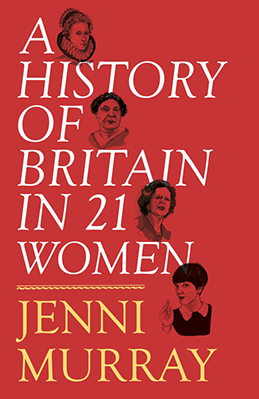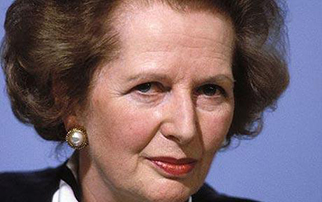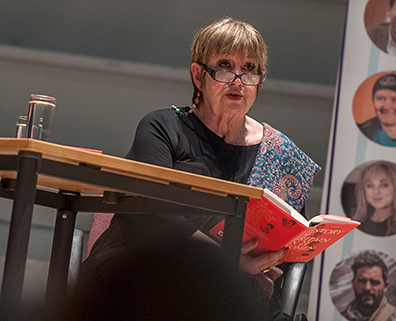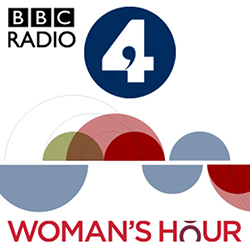Hudds LitFest – Uni honorary award recipient welcomed to festival
 Photo courtesy of Jonathan Jacob Photography
Photo courtesy of Jonathan Jacob Photography
Wed, 08 Mar 2017 14:04:00 GMT
Dame Jenni Murray was in conversation with lecturer Dr Sarah Falcus about her new book, A History of Britain in 21 Women
 DAME Jenni Murray, who is marking her 30th anniversary as chief presenter of Radio 4’s Woman’s Hour, has written a book about the lives of the 21 women she believes have made the biggest impact on British history. They range from the fearsome warrior queen Boadicea… to the “terrifying” Margaret Thatcher.
DAME Jenni Murray, who is marking her 30th anniversary as chief presenter of Radio 4’s Woman’s Hour, has written a book about the lives of the 21 women she believes have made the biggest impact on British history. They range from the fearsome warrior queen Boadicea… to the “terrifying” Margaret Thatcher.
When she spoke at a Huddersfield Literature Festival event, in conversation with the University of Huddersfield’s Dr Sarah Falcus, Dame Jenni explained her choices. They include a wide range of women from the arts, sciences and politics, including names such as Queen Elizabeth I, Jane Austen, Emmeline Pankhurst, computer pioneer Ada Lovelace, fashion designer Mary Quant, Labour minister Barbara Castle and SNP leader Nicola Sturgeon.
 Lady Thatcher (pictured left) could not have been left out, Dame Jenni told the large audience at Huddersfield Town Hall.
Lady Thatcher (pictured left) could not have been left out, Dame Jenni told the large audience at Huddersfield Town Hall.
“She was the first female Prime Minister, but she would always say ‘I’m not a woman Prime Minister, I’m the Prime Minister.”
As a broadcaster, Dame Jenni had several encounters with Mrs Thatcher.
“She was just terrifying! You knew, as a journalist, that if you were not absolutely on top of your brief, she would tear you limb from limb and enjoy every minute, and her blue eyes would bore into you.”
Dame Jenni spoke about her childhood fascination for Boadicea – she rejects the modern trend to use the name “Boudicca” – but since her teenage years she has been “obsessed” by another inclusion in her book, Queen Elizabeth I.
“She may have been born to the job but her journey to the throne was long and hard. Her childhood and youth could not have been more difficult and risky.”
Elizabeth I is the only English monarch in Dame Jenni’s selection, but she did express admiration for the present queen.
 “She is the longest-serving monarch in British history and her energy and fortitude are quite remarkable. I have nothing but admiration for her, but my main interest lies in women who made an impact not because they inherited their role but because they fought prejudice and succeeded despite their background and their gender.”
“She is the longest-serving monarch in British history and her energy and fortitude are quite remarkable. I have nothing but admiration for her, but my main interest lies in women who made an impact not because they inherited their role but because they fought prejudice and succeeded despite their background and their gender.”
The book, A History of Britain in 21 Women, concludes with Nicola Sturgeon, as “the woman who could change the history of Britain” by taking Scotland out of the Union. But in addition to the cause of nationalism, Ms Sturgeon was also committed to gender issues such as equal pay, said Dame Jenni (pictured right), who is a recipient of an honorary award from University.
During her conversation with Dr Falcus, Dame Jenni was fiercely critical of a proposal that feminism should be cut from the A-level politics syllabus.
“Despite the widely-held assumption that women in the 21st century have achieved complete equality of opportunity with men, the story of the women who from the earliest times struggled to make their way in a male-dominated world was deemed an unnecessary part of the syllabus,” she said.
 Dame Jenni is Barnsley-born and raised, and told the audience that her Yorkshire appearance at Huddersfield Literature Festival was like a homecoming. During her talk she spoke about her education – and how she still favours all-girl or all-boy schools as being better for the development of both sexes – and she outlined her broadcasting career. This included stints on TV’s Newsnight and Radio 4’s Today until in 1987 she was offered her dream job, at the helm of Woman’s Hour, which she had been hearing since she was a small child in the 1950s.
Dame Jenni is Barnsley-born and raised, and told the audience that her Yorkshire appearance at Huddersfield Literature Festival was like a homecoming. During her talk she spoke about her education – and how she still favours all-girl or all-boy schools as being better for the development of both sexes – and she outlined her broadcasting career. This included stints on TV’s Newsnight and Radio 4’s Today until in 1987 she was offered her dream job, at the helm of Woman’s Hour, which she had been hearing since she was a small child in the 1950s.
When she fielded audience questions, Dame Jenni said that although women had made big strides towards equality in education and career opportunities, the issue of childbirth and rearing was still a huge hurdle, especially in view of what she described as “the parlous state of childcare in this country”.
She argued strongly for childcare to be the equal responsibility of fathers and mothers, and praised a firm that had recently adopted a policy of equalising paternity and maternity leave.
- A History of Britain in 21 Women is published by Oneworld. Dame Jenni Murray’s full list is: Boadicea, Aphra Behn, Elizabeth I, Fanny Burney, Jane Austen, Mary Wollstonecraft, Constance Markievicz, Nancy Astor, Ada Lovelace, Caroline Herschel, Elizabeth Garrett Anderson, Millicent Garrett Fawcett, Emmeline Pankhurst, Gwen John, Rosalind Franklin, Ethel Smyth, Margaret Thatcher, Nicola Sturgeon, Mary Quant, Barbara Castle and Mary Somerville.







